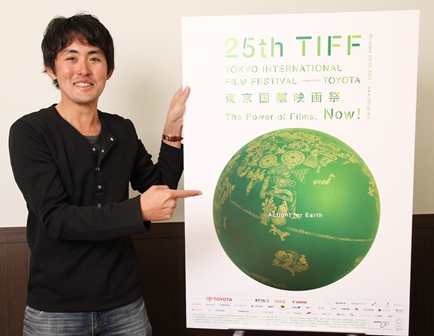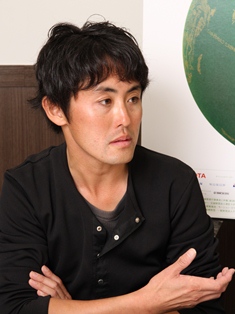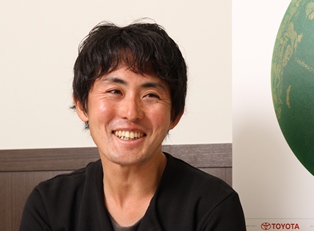Interview with Director Bunyo Kimura (“Where Does Love Go? ~Tentatively Titled~“)

The appeal of Bunyo Kimura’s “Where Does Love Go?” is unusual. Filmed in black-and-white and mostly taking place in a cramped, dark apartment, the movie charts the quotidian activities of an early middle-aged couple, Yoko (Aasako Maekawa) and Koji (Satoru Jitsunashi), during the course of one night and the following morning. They eat curry and talk about their life together, which seems unexceptional but for Yoko’s references to changing her name and never being able to make friends. Eventually we learn that the couple has moved many times over the course of their relationship. They are fugitives.
Japanese viewers will recognize the inspiration. Last winter, Makoto Hirata, a former executive of the Aum Shinrikyo religious cult, which was responsible for the Tokyo sarin gas attack in 1995, surrendered to police after 17 years on the run and was arrested on suspicion of kidnapping. Shortly thereafter his female companion during most of that period also gave herself up and was arrested for harboring a fugitive.
Non-Japanese viewers, however, may be at a loss to appreciate the finer accomplishments of the film, which isn’t to say they won’t appreciate other things, like the carefully calibrated mood of weariness that hangs over the couple. Though it later becomes clear that Koji is going to give himself up, the couple’s behavior when they are together does not betray any fear. The future has less importance than the past, which weighs heavily on them. They are tired of this life and despite the still palpable love they feel for each other, it is time to make a change.
“This is a story of two people who have been together for 17 years,” Kimura says during an interview. “All that time the woman kept changing her name as they moved from place to place, assuming different identities, and the guy never stepped out into the light of day. But the earthquake of March 2011 made them think about giving themselves up. What does that mean to them, and what does that mean to us? This is what I wanted to explore. If it appears to be a love story to some, it may not seem like one to others. I did not set out to make a love story. I just wanted to tell a story about those two people.”

Obviously, the project was a fast one. Less than a month after Hirata surrendered, Kimura and his two actors came up with a plan for the movie, and the director and Maekawa collaborated on the script. They shot it last April.
“I thought it would be difficult,” Kimura says, “but by compressing this couple’s shared existence into a single night’s events I felt we could convey the flow of time, show that the 17 years they spent together actually existed.” The director admits that he wasn’t overly concerned with whether or not the viewer picked up on the historical references, or whether such references were necessary to appreciate what he was trying to do. “It depends on the viewer. Some people may want to learn about what happened in Japan during those 17 years. A foreign viewer who knows nothing about those things could still relate to the situation of a person who never left his room. I was aware that different viewers would take different things away from it. Are you familiar with ‘Fengming: A Chinese Memoir,’ a documentary by the Chinese director Wang Bing? It’s about an old woman who lived through the Cultural Revolution. It was a very difficult time, but all you see in the film is this woman talking about her experiences. Maybe they spent one whole evening talking in front of the camera. After seeing it I wanted to learn more about Chinese history. A film can give you that kind of motivation to expand your imagination and learn things.”

Kimura acknowledges that his two actors were indispensable to his purposes, since they are the only characters in the movie and most of the story is told indirectly through their subtle interactions. On the surface they seem like a typical bored married couple who have been together too long, but such a reading would miss the point.
“They’ve been theater actors for almost 20 years,” Kimura explains, “and each one leads a company, so they know how to write scripts and put on plays. I’m not sure if I myself understand how much weight that kind of time period can have on a person, so rather than tell the actors what to do I simply respected what they brought to the scenes. If the weariness on display is convincing, it’s because of them, not me.”
The director had more prosaic concerns, such as the final long scene when Koji finally leaves the dim apartment and goes out into the harsh light of day to give himself up. The scene was shot over three hours in public, which means the actor had to interact with people going about their business while a camera followed him through Tokyo streets, into public restrooms, and even onto a crowded train. It was a nerve-wracking procedure.
“The cameraman had it worse,” says Kimura. “He was kicked by people on the train.”
(Text by Philip Brasor)



















